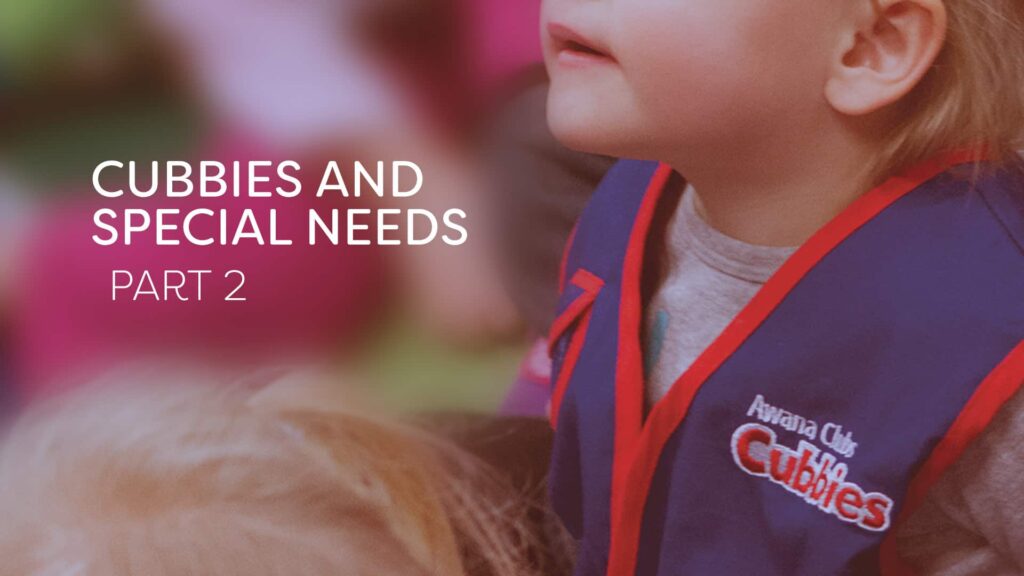Series: Cubbies and Special Needs – Part 2

Enfolding Special Needs Preschoolers Into Your Cubbies Club
Awana Cubbies Curriculum is a good entry point for all children, including our children who have special needs. With volunteers and training, churches can make a big impact on all families for God. We realize that a local Awana club cannot meet the needs of every individual child. However, the club can still benefit the child as he or she feels the love of the leader and socially interacts with other children. Churches will need to decide the scope of their ministry to children with special needs.
Special needs have been defined by what a child cannot do without help that a typical peer can do. It may be delays in reaching expected educational, physical or emotional milestones, or in doing activities. The range can be from mild learning disabilities to severe mental retardation, to physical disabilities, terminal illness, and/or food allergies, to name a few.
Let’s get to know, love and serve all children, especially our extra-special preschoolers. They are special to us and even more so to Jesus! Let’s get to know their diverse abilities, basic needs, and challenges so we can serve them better. Let’s show them love through our godly attitude and actions. Finally, we should serve them through accommodating and modifying our activities to reach and include them as well as communicate and involve their parents. So what does it mean to enfold all preschoolers into your Awana ministry? Let’s explore that together.
To explore this topic together, we’ll break this down into three sections: Know, Love, and Serve.
We have previously focused on “Know,” and diving deeper into understanding various types of limitations children can face, and examples of ways to adapt circumstances to better support them.
This time we’ll focus on “Love.”
Love — based on unconditional, steadfast love.
It all starts with your personal attitude as a leader. Let’s start with an accepting attitude. Parents would love for you to include their specially-designed preschoolers in your Puggles and Cubbies club ministries. Other preschoolers are very accepting of them and this interaction allows all to benefit and learn from each other. One example of this is learning better socialization skills.
“A national survey shows that 70% of early childhood programs include children with disabilities.” However, “They are in our secular preschool programs, where are they in our church programs? Less than 0.1% of North American churches provide for deaf children and only 4% of deaf people attend church.”
Love in Attitude
As a leader, your attitude should be contagious. It should arouse interest, excitement, a “want- to, can-do attitude.” It should say “You belong,” “I believe in you” and “We are so glad you are here. We desire you just like God desires us!” The severity of the disability coupled with a nurturing, accepting attitude will greatly influence how a child progresses.
As a club and church, your attitude speaks volumes as to whether you are welcoming. Enfold these dear children making them feel safe, wanted, and loved. Parents mourn over their child’s lost potential, worry about their future, and try to make it through today. Where better to receive hope, than from the God of all hope through His family? Let’s truly be His arms, feet, eyes, ears, and especially His heart! Are you willing to surround and sustain these families with a love incomprehensible? Be Jesus to them!
Love in Preparation
One way to help each child feel welcome is to consider having the specially-designed child visit club early, see the room(s), schedule, and so forth. Help them feel comfortable — both the child and parent. By loving the child you are loving the parent. Plan ahead to ward off problem times and places. One way to show this love is during Lesson Time. Consider doing a lesson on all the ways we get around — plane, train, car, bicycle, bus, walk, run, skip, etc. Explain that not all their friends may be able to walk to get around. They may need to use a wheelchair, crutches, braces, and so forth.
Love in Learning Environment
Look next to your learning environment. “Children with disabilities almost by definition don’t learn naturally, even in an engaging environment. They don’t know what is important to pull from it,” says Sandall (University of Washington College of Education). “We have to ask what typically developing children are accomplishing, then find out how we can help the kids who aren’t able to do that automatically. The key is to find ways to meet a child’s specialized needs without significantly altering the nature of daily instruction and activities.” Therefore, be intentional and creative to include sensory based Total Time Teaching throughout club activities to enhance the learning. Make sure they are directed at the special needs of any of your preschoolers.
Providing this support along with effective tools helps improve learning and increase success and fun. Use child-focused instructional strategies, or in other words, have a game plan, keeping in mind most children will be able to do what other children do just by adapting it to their abilities.
Remember Our Motivation
Let’s get to know, love and serve these extra- special preschoolers God sends our way so that one day they can know, love and serve our Lord Jesus Christ!
Interested in this topic? Stay tuned to the rest of the series!
The above is an excerpt from a longer article, “Can I Come Too?” available as part of the Cubbies Teaching Plans. We wanted to share it with you on the blog as well, as this issue continues to be an important one for preschool ministry leaders and volunteers.
The above is the second in a series. Click here for Part 1. Click here for Part 3.
